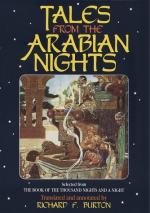[FN#206] This may mean, I should know her even were my eyes blue (or blind) with cataract and the Bresl. Edit. ix. 231, reads “Ayni"=my eye; or it may be, I should know her by her staring, glittering, hungry eyes, as opposed to the “Hawar” soft-black and languishing (Arab. Prov. i. 115, and ii. 848). The Prophet said “blue-eyed (women) are of good omen.” And when one man reproached another saying “Thou art Azrak” (blue-eyed!) he retorted, “So is the falcon!” “Zurk-an” in Kor. xx. 102, is translated by Mr. Rodwell “leaden eyes.” It ought to be blue-eyed, dim-sighted, purblind.
[FN#207] Arab, “Zalabiyah bi-’Asal.”
[FN#208] Arab. “Ka’ah,” their mess-room, barracks.
[FN#209] i.e. Camel shoulder-blade.
[FN#210] So in the Brazil you are invited to drink a copa d’agua and find a splendid banquet. There is a smack of Chinese ceremony in this practice which lingers throughout southern Europe; but the less advanced society is, the more it is fettered by ceremony and “etiquette.”
[FN#211] The Bresl. edit. (ix. 239) prefers these lines:—
Some of us be hawks
and some sparrow-hawks, *
And
vultures some which at carrion pike;
And maidens deem all
alike we be *
But,
save in our turbands, we’re not alike.
[FN#212] Arab. Shar a=holy law; here it especially applies to Al-Kisas=lex talionis, which would order her eye-tooth to be torn out.
[FN#213] i.e., of the Afghans. Sulaymani is the Egypt and Hijazi term for an Afghan and the proverb says “Sulaymani harami”—the Afghan is a villainous man. See Pilgrimage i. 59, which gives them a better character. The Bresl. Edit. simply says, “King Sulayman.”
[FN#214] This is a sequel to the Story of Dalilah and both are highly relished by Arabs. The Bresl. Edit. ix. 245, runs both into one.
[FN#215] Arab. “Misr” (Masr), the Capital, says Savary, applied alternately to Memphis, Fostat and Grand Cairo each of which had a Jizah (pron. Gizah), skirt, angle, outlying suburb.
[FN#216] For the curious street-cries of old Cairo see Lane (M. E. chapt. xiv.) and my Pilgrimage (i. 120): here the rhymes are of Zabib (raisins), habib (lover) and labib (man of sense).
[FN#217] The Mac. and Bul. Edits. give two silly couplets of moral advice:—
Strike with thy stubborn
steel, and never fear *
Aught
save the Godhead of Allmighty Might;
And shun ill practices
and never show *
Through
life but generous gifts to human sight.
The above is from the Bresl. Edit. ix. 247.
[FN#218] Arab. “Al-Khanakah” now more usually termed a Takiyah. (Pilgrim. i. 124.)
[FN#219] Arab. “Ka’b al-ba’id” (Bresl. Edit. ix. 255)=heel or ankle, metaph. for fortune, reputation: so the Arabs say the “Ka’b of the tribe is gone!” here “the far one"=the caravan-leader.




